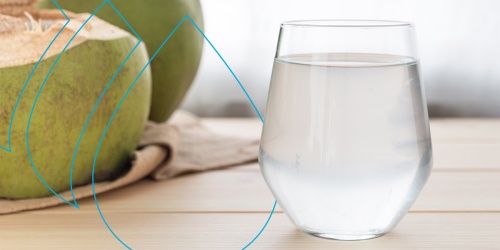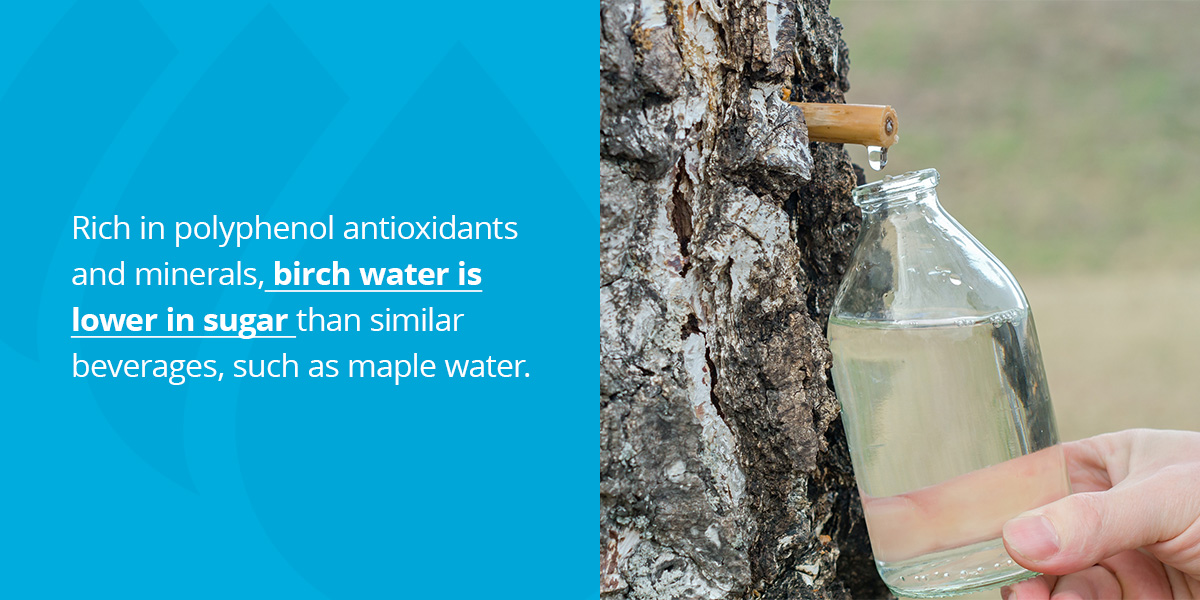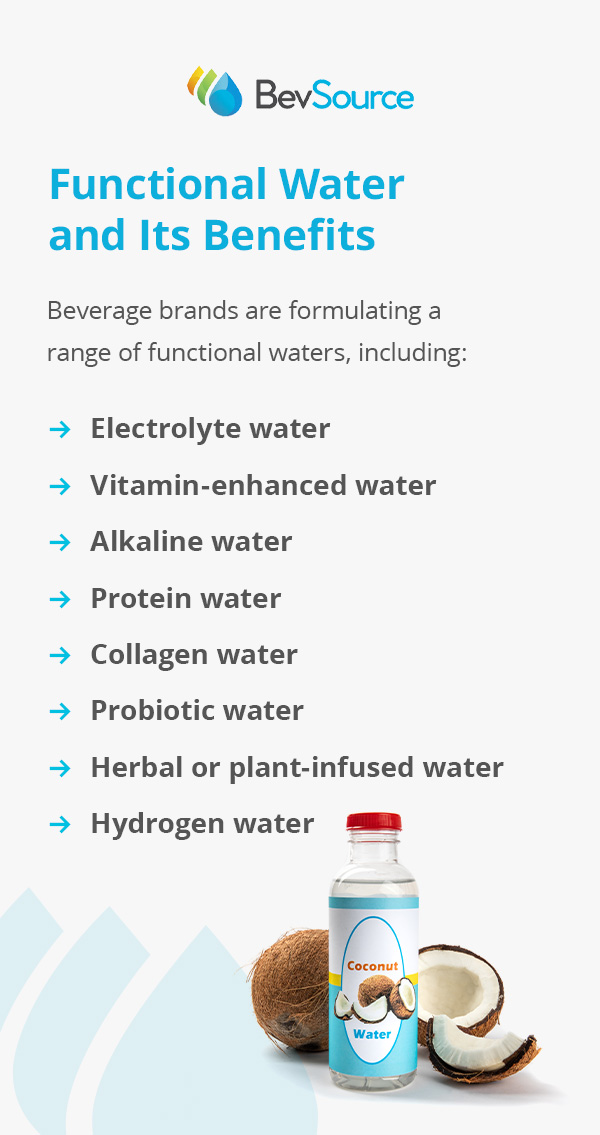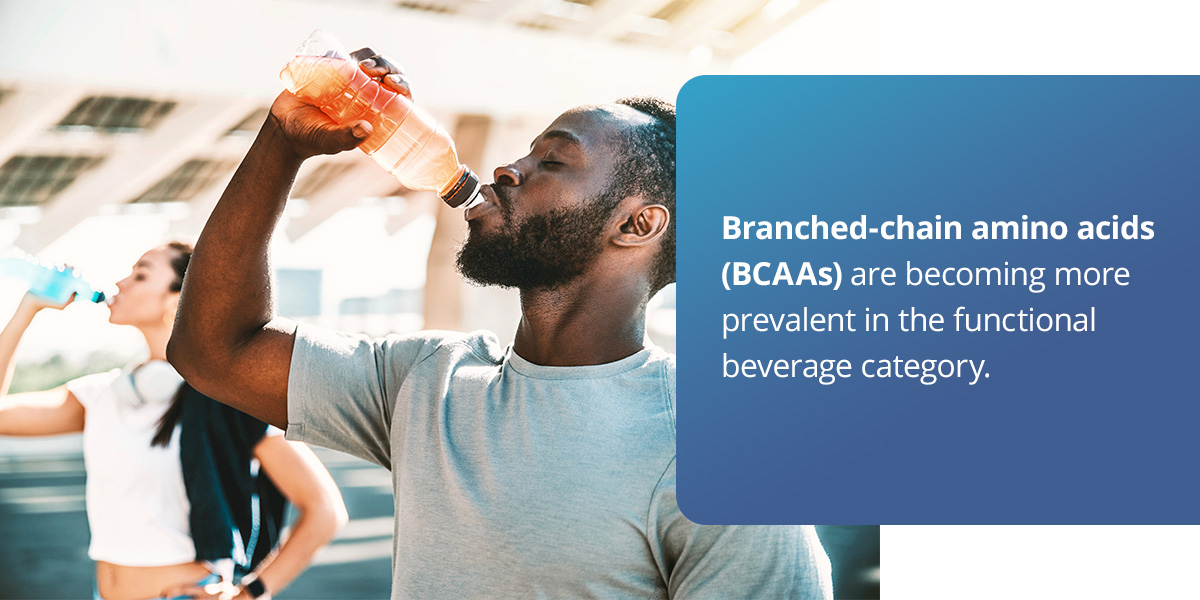Redefining Refreshment: The Emergence of Plant-Based and Functional Water

A host of beverage categories have entered the industry, boasting health and wellness attributes, promising functional benefits, and offering competition for mainstream categories. Plant-based and functional beverages, such as coconut water, maple water and electrolyte-enhanced waters, have gained popularity due to their natural origins, unique flavor profiles and potential health benefits.
As consumer demand for products that support their health and wellness continues to rise, beverage brands are stepping up to meet this need. It's no surprise that consumers are increasingly seeking beverages that do more than just quench thirst, leading to a surge in popularity of water with functional benefits. our brand can experiment with natural and healthy ingredients and formulate unique plant waters to capitalize on this growing trend.
The Shift Toward Healthier Beverage Choices
Consumers in the United States are increasingly prioritizing healthier lifestyles. Around 82% consider health and wellness a top priority in their daily lives. Gen Z and millennial consumers, in particular, are purchasing more health and wellness products than older generations.
Consumers want products that support their health and wellness goals, and many beverage brands have stepped up. According to NielsenIQ's 2023 Consumer Outlook, 46% of consumers consider mental or physical wellness one of their top priorities. With 47% of Americans having at least one of the three risk factors that contribute to heart disease, it's no surprise that consumers are increasingly seeking beverages that do more than satisfy their hydration needs. Many consumers are leaning toward low-carbohydrate, sugar-free beverages with functional ingredients.
Plant-based consumption is also increasing, which provides beverage brands with an opportunity to formulate functional and plant-based drinks. Plant-based diets are perceived as healthier, and many people are experimenting with flexitarian and vegan diets. Additionally, plant-based diets are perceived as the more sustainable, ethical option.
Heightened consumer awareness of what they put in their bodies has also sparked a clean-label movement. Consumers want proof that their beverages are formulated with natural, clean ingredients free from artificial colors and flavors. Around 93% of U.S. households have purchased products with clean labels at grocery stores, which is promising for beverage brands looking to innovate — plant-based and functional water presents an exciting solution.
Functional and plant waters deliver several benefits per serving. They make it easier for brands to deliver ingredients with targeted benefits, and they appeal to individuals with lactose intolerance, digestive disorders and high cholesterol. As the "better-for-you" trend grows, brands can expect increased opportunities to break into health-related markets with low-sugar, plant-based and functional formulations.
The Lowdown on Plant-Based Water
Plant-based water, or plant water, is a beverage containing the liquid extracted from trees and plants.
These beverages are often perceived as more sustainable alternatives to traditional beverages, and they appeal to environmentally conscious consumers. They're also rich in electrolytes, antioxidants and trace nutrients, making options like watermelon water and maple water appealing to health-conscious consumers seeking alternatives to sugary and artificial beverages.
Because they align with trends in sustainability, plant-based lifestyles and proactive wellness, plant waters are also a natural fit for functional beverages and sports nutrition. In addition to containing essential electrolytes, vitamins and minerals that support hydration, recovery and overall well-being, their low-calorie profiles resonate with fitness-conscious consumers. Plant waters offer convenient, minimally processed options for athletes, casual fitness enthusiasts and wellness-focused individuals.
The Rise of Coconut Water and Its Impact on the Plant-Based Water Market
The coconut water craze played a pivotal role in sparking interest in plant-based waters. This beverage quickly gained recognition as "nature's sports drink," and its popularity demonstrated the consumer appetite for natural, functional beverages.
Coconut water paved the way for other plant-based waters, including maple water, birch water and cactus water, to enter the market. These beverages, often marketed as offering specific health benefits, capitalized on the growing demand for natural and functional drinks.
Unlike traditional flavored waters, plant-based waters are typically free from added sugars and artificial flavors. Some of the potential functional benefits they offer include boosting immunity and providing a natural energy boost. These differences have contributed to the growing popularity of plant waters as consumers seek healthier, more natural beverage alternatives.
These gluten-free and phytonutrient-dense powerhouses are attracting consumers. Beverage brands can explore many ingredients to meet consumer demands for flavorful beverages with targeted functional benefits. Explore some plant-based waters below.
Coconut Water
The increase in the plant-based beverage market is likely largely attributed to the popularity of coconut water, which remains the most sought-after and widely consumed plant-based water. Its appeal among athletes and sports enthusiasts stems from the fact that it naturally contains essential vitamins and minerals like sodium, magnesium, calcium and manganese, making it an excellent choice for hydration and recovery. Coconut water has a sweet, tangy flavor and replenishes electrolytes without the sugar and calories common in traditional post-workout beverages. It can also support heart health and lower blood pressure.
Birch Water

Birch water, also known as birch sap, has been a popular beverage in Northern Europe and China for centuries. Much more recently, it's found its way to the U.S. Rich in polyphenol antioxidants and minerals, birch water is lower in sugar than similar beverages, such as maple water. It is also an excellent source of manganese, which helps promote brain health and strengthen bones. Birch water has a naturally sweet flavor profile that's quickly becoming a consumer favorite.
Cactus Water
Cactus water is derived from the prickly pear cactus, also known as the nopal cactus. It is prized for its hydrating, functional qualities and is naturally full of electrolytes. It is also low in calories, making it an ideal choice for consumers looking for enhanced hydration. Prickly pear is also rich in powerful antioxidants like betanin, betacyanin and isorhamnetin, which help reduce inflammation and combat free-radical-related damage.
The high antioxidant and electrolyte content helps reduce muscle soreness and support faster recovery after intense workouts. The fiber content in cactus water also supports healthy digestion and may aid in weight management. It has a subtle sweetness and natural pink color.
Beyond hydration, prickly pear also offers skin-related benefits. Cactus water is rich in vitamins C and E and supports collagen production, which helps maintain skin firmness and reduces signs of aging.
Maple Water
Maple water is the pure sap of maple trees. The market for maple water kicked off in the early 2010s with brands like Drink Simple and has now evolved as companies have innovated with flavors and carbonation. This clear liquid is composed of approximately 95%-97.5% water and contains a variety of nutrients, including electrolytes, antioxidants and trace minerals.
Twelve ounces of maple water contains 40% of the daily value of manganese, which offers several benefits for joint health. Functional water brands tout enhanced hydration, boosted exercise performance and lower oxidative stress. Maple water may appeal to people managing diabetes because it contains abscisic acid and has a low glycemic index.
Bamboo Water
Bamboo leaf extract has been hailed as a natural remedy for centuries and has entered the mainstream market in response to the growing interest in natural, functional beverages. Bamboo leaf offers many potential benefits, from liver protection to antioxidation. Bamboo leaf flavonoids — bioactive compounds found in bamboo leaves — also possess antioxidant, antibacterial and anti-inflammatory properties and may even stimulate collagen production. Bamboo water's refreshing neutral flavor is ideal for formulating with other functional ingredients and fruity flavors.
Watermelon Water
Watermelon water is intensely refreshing and flavorful. It is made from the juice of watermelons and is often blended with the fruit's pulp for added texture and nutrients. Its 92% water content and natural electrolyte, antioxidant and amino acid content make it an excellent natural hydration option after exercise or during hot weather.
Watermelon water is often marketed as a sustainable beverage, as it can be produced from surplus or imperfect watermelons that would otherwise go to waste. With its refreshing taste, functional benefits and sustainable production, watermelon water is carving out a distinct niche in the growing plant water market.
Functional Water and Its Benefits

Functional waters typically provide added benefits to consumers' water experience beyond vitamins and minerals. The reusable water bottle culture is in full swing, but today's consumers demand more from their water. They are looking for water with benefits, from electrolytes to protein. The common themes among these beverages include innovation in functionality, hydration and lowering sugar levels.
Consumers want convenient and portable solutions that fit their lifestyles, and disruptive new players are entering the market. In the U.S., the functional water market size is expected to reach an estimated value of $9.41 billion by 2032, driven by rising demand for low-calorie, healthy drinks enriched with functional ingredients. Functional waters make up a substantial part of the market — 17% of waters launched in the U.S. now feature functional claims.
Consumers are looking for digestive health and immune-boosting beverages to meet their wellness needs. In response, beverage brands are formulating a range of functional waters, including:
- Electrolyte water: Electrolyte waters are enhanced with sodium, potassium, magnesium and other electrolytes. They help maintain hydration levels, especially during hot weather or after vigorous physical activity when electrolyte loss occurs through sweating.
- Vitamin-enhanced water: Vitamin-enhanced waters offer another opportunity for beverage brands to provide hydration along with added nutritional value, making it popular with health-conscious consumers. These beverages are typically fortified with a blend of vitamins, such as vitamins B, C and E, as well as minerals like potassium and magnesium.
- Alkaline water: Alkaline water, like Essentia, has a higher pH level than regular drinking water, typically ranging from 8 to 9. This increased pH is achieved by adding alkaline minerals such as calcium, potassium and magnesium.
- Protein water: RTD protein waters such as Protein2o make protein consumption even easier for consumers. They're high in protein but often have fewer calories than protein supplements and lack added sugar.
- Collagen water: Collagen-infused water contains collagen peptides, which are believed to support skin, hair, joint and nail health. They have emerged as a popular beverage at the intersection of health, wellness and beauty from within. Combining hydration with the potential benefits of collagen supplementation appeals to consumers looking for convenient ways to support their skin, joints and overall wellness.
- Probiotic water: Probiotic waters offer an innovative approach to functional beverages, catering to health-conscious consumers looking for tasty ways to support their gut health while staying hydrated. Probiotic waters like Karma and Bu incorporate probiotics and, often, vitamins. They promote a healthy gut biome, boost the immune system and support overall health.
- Herbal or plant-infused water: The potential of plant- or herb-infused water is practically limitless. Brands like Heywell are experimenting with a range of functional extracts, from adaptogenic ingredients like lion's mane to botanicals like lavender and chamomile. These ingredients have various targeted benefits, from improving cognitive function to boosting the immune system.
- Hydrogen water: Hydrogen water is infused with hydrogen molecules. Many claim hydration water has significant benefits, like improving athletic performance, reducing inflammation and boosting metabolic health. Research is still ongoing.
The Rise of Functional Hydration
Consumers want refreshing hydration, and in a world that prizes convenience, they demand products that quench thirst and offer additional health benefits.
Functional beverages contain ingredients selected specifically to provide functional benefits that appeal to today's health-conscious consumer. Plant-based drinks often carry a "health halo," where consumers perceive them as healthier options that provide natural, functional benefits. Advanced beverage formulation technology has allowed brands to incorporate a wide range of ingredients using a foundation as simple as water. Some of the primary functional benefits that these waters offer include:
Digestive Health
Digestive health is a primary concern for consumers, and many beverages include pre-, pro- and postbiotics in their functional waters. Ginger, peppermint, dandelion and rosemary tout similar benefits, allowing brands to appeal to consumers with natural ingredients.
Natural Energy
Traditional energy drinks are often high in caffeine and sugar. Many consumers want to cut back or eliminate these ingredients, and beverage brands can formulate waters offering clean, natural alternatives in response. Energy-boosting formulations often include ingredients like yerba mate, green tea extract and guarana to provide a cleaner, more sustainable energy boost without the crash.
Stress Management and Mood Enhancement
Consumers are taking a more holistic approach to their physical and mental health. Many are turning to functional waters with adaptogenic ingredients like lion's mane, ashwagandha and holy basil for their potential stress resilience and mood-enhancing benefits.
Additionally, a large share of the functional beverage trend is geared toward consumers who want to curb their alcohol intake. Functional beverages have the potential to give consumers many of the same effects, as they may help consumers unwind or perk up for social occasions.
Hydration and Athletic Recovery

Athletes and active people always seek more efficient ways to replenish electrolytes and aid recovery. Electrolyte and plant-based waters provide this alternative. Branched-chain amino acids (BCAAs) are becoming more prevalent in the functional beverage category. They provide an energy boost and assist in post-workout recovery.
Immune-Boosting Properties
Immunity is a global health priority, with 44% of consumers saying they're interested in beverages containing ingredients scientifically proven to offer immune support. Plant-based waters are an excellent option for many consumers looking for a boost. Functional ingredients with purported immune-boosting properties include vitamin C, turmeric, ginger and honey.
Sustainable and Ethical Considerations
At least 65% of consumers want to make choices that lead to living a healthy and sustainable life. Health and sustainability trends intersect in the beverage market. Consumers who want healthy, natural alternatives often pay more attention to a brand's sustainability efforts. As a result, many beverage brands are actively looking to reduce their carbon footprints. They are reconsidering the ingredients, packaging and logistics of beverage development.
Meeting consumer sustainability demands is more complex than it appears. While plant-based beverages are more ecologically friendly than animal-based products — and many consumers are becoming more aware of the environmental effects of animal agriculture — there are still some sustainability considerations.
For example, natural ingredients give the perception of sustainability, but the truth may differ. So, in developing plant-based and functional waters, beverage brands are prioritizing partnerships with suppliers that adhere to eco-friendly agricultural practices. They are screening their suppliers for sustainability and fostering relationships with local farmers to reduce transportation-related carbon emissions and promote biodiversity.
With the majority of consumers willing to pay more for products with sustainable packaging, brands are quickly rethinking their options. They're switching to lightweight, recyclable materials, such as aluminum, to reduce the demand for virgin resources and single-use plastics. They are using this sustainability focus to create an appealing narrative, educate consumers and build trust in a skeptical market.
Supply chain and scalability are also concerns for developing plant waters. As sales increase, sourcing high-quality plant-based ingredients in large quantities while upholding sustainability initiatives can pose a challenge. Supply chain bottlenecks can result from limited ingredient availability, expanding manufacturing capabilities and logistics difficulties. These bottlenecks can drive up costs and slow growth.
Additionally, beverages with high sugar content and microbial loads, like maple water, can present challenges for co-packers due to the additional microbial risk and additional cleaning processes. It's essential to find a co-packer willing to take on plant water to address these challenges.
Price still remains a major factor influencing the purchasing of functional beverages, including enhanced waters and plant-based waters. Due to the high costs of production, many plant waters are positioned as premium, beverage brands to justify the higher price points.
Functional Water Innovation and Product Development
Functional and plant-based waters are part of an overarching health and wellness trend that's here to stay. As consumers become more adventurous, brands have multiple opportunities to innovate. Unique beverage experiences are becoming increasingly important to consumers, and botanicals and tropical fruits are likely to increase in popularity.
Despite the projected market growth, functional and plant-based waters remain a niche category within the total refreshment beverage universe, and the landscape is becoming crowded. Brands must look for opportunities to differentiate themselves, including stepping up their sustainability efforts.
Marketing and Consumer Education
Water is a wellness powerhouse, but some skepticism remains regarding the potential health benefits of water with added functional benefits. The rise of beverages embracing natural ingredients with targeted benefits has triggered an opportunity for brands to use high-quality, proven ingredients and communicate openly with consumers. For plant-based waters, in particular, brands must be prepared to invest in marketing and educational campaigns, as many consumers are not familiar with the benefits or existence of these types of plant-based waters.
Functional and plant-based beverage brands should integrate consumer feedback into new beverage development, and they can compound this trust capital with educational resources. Consumer education doubles up as effective marketing, alongside sustainable packaging, a clear understanding of the health benefits and beverages that target personalized health and wellness goals.
Ride the Functional and Plant-Based Water Wave With BevSource
As consumer demand for targeted health benefits and minimally processed options grows, plant waters and functional waters are carving out a niche. They offer competition to traditional sports and energy drinks and enhance the functional beverage landscape with innovative, versatile offerings.
BevSource can help brands navigate the shift from simple hydration solutions to beverages that deliver specific functional benefits, providing support with formulation, ingredient sourcing and production strategies to create products that meet evolving consumer expectations and stand out in the competitive marketplace. We collaborate with you on every stage of your beverage journey, from development and sourcing to production.
Functional hydration and plant-based water present exciting opportunities for reaching a new or growing consumer market. Our customized beverage consulting solutions get you to market efficiently and profitably. Speak to a beverage expert to make your vision a reality!

